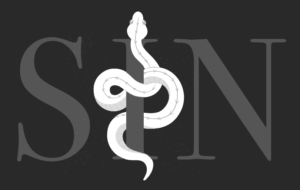Sin is a loaded word. For those outside the faith, it’s a funny and dated religious term. For Christians, we repeat it so often that it loses its bite. Scripture reveals that sin is worse than we know. Jesus is so serious about it that he says, “If your eye causes you to sin, gouge it out.” What is it about sin that’s so fatal it would require Jesus to go to the cross?
This Lent we do a soul examination, studying all the ways God describes the complex of sin. Lawlessness, adultery, rebellion . . . The cancerous nature of sin means that we need to go deeper than surface confession. The problem is worse than we know, which makes our Savior greater than we can imagine.

Invocation
Glory be to the Father, and to the Son, and to the Holy Spirit, who delivers us from all evil.
Invitation Prayer
Lord, you know the evil that comes when we are alone. You prayed in the Garden while your friends were asleep. You faced the agony of death and evil alone. Do not leave or forsake us in our isolation. Draw near in the dark of night when no one else is around. Have mercy, O Lord, Amen.
Word
Exodus 32:5-6
When Aaron saw this, he built an altar before it. And Aaron made a proclamation and said, ‘Tomorrow shall be a feast to the Lord.’ And they rose up early the next day and offered burnt offerings and brought peace offerings.”
Meditation: Not a Tame God by Megan Roegner
I’ve never had a great deal of sympathy for the Israelites as they wander through the desert for their 40 years. How did they keep screwing up? I mean, I screw up all the time, but I am not being fed on manna from heaven and led by pillars of cloud and flame. God provided them with physical manifestations of his presence and power, and still…they make a golden calf to worship.
But as I started to think about idols and the way God reveals himself to us, I started to think about the Israelites in a different light. I’d always read this story as the Israelites completely abandoning God. However, with the fashioning of the golden calf juxtaposed against Aaron’s proclamation of “a feast of the Lord,” I think something more complex was happening. What if the Israelites didn’t believe they were abandoning God but rather trying to mold him into a different image?
Coming out of Egypt, the Israelites would have been familiar with Egyptian deities, like the cow-goddess Hathor and her son, the Apis bull. The Egyptians likely believed that their gods were all-powerful. Yet, they worshiped statues that never moved and animals they brought themselves to their holy places. The God of Abraham and Isaac, though, was not static, could not be controlled. Instead of being still or being led, he was the swirling pillar that guided the Israelites on their way. And when you’re not exactly comfortable with where you’re going, it’s sinful human nature to want to take the reins yourself. Maybe the Israelites thought that they could refashion God in a way to make him a little bit more manageable.
This is an important idea for me to consider because while I could never imagine myself worshiping a golden idol, I do think I am tempted to try to make my understanding of God and his Word fit the mold of how I think he should be, which, shockingly, very closely resembles my own values, personality, and ideals.
When our idols aren’t golden calves, they are much more insidious. They often seem like good things—family, marriage, patriotism, health, career, social causes, traditions… They can be good things when we see them for what they are—gifts from God—but they should not be confused with God himself. Yet, it’s so tempting to idolize the gifts, to believe that loving the gift is the same as loving God, because they are human and easier for us to touch and comprehend and, yes, control.
In thinking about the Israelites’ measly calf statue compared to the majesty and power of the God who parted the Red Sea, I’m reminded of C.S. Lewis’s The Chronicles of Narnia,which tells us throughout the series that Aslan isn’t a “tame lion.” We might think that a god who stays where he’s put and does what we expect is safe. But how can a predictable god disrupt the ugliness of our sin? Would a safe god willingly suffer to save us?
As Mr. Beaver tells Lucy Pevensie about Aslan, “‘Course he isn’t safe. But he’s good.”
Father, thank you for not being tame, predictable and safe. Forgive us for the times we have turned to others instead of to you. Help us to place our trust in you even when we don’t understand your plans. Amen.
Sending
In the face of evil, may God the Father of our Lord Jesus Christ fill you with every spiritual blessing. Go in his name, Amen.
